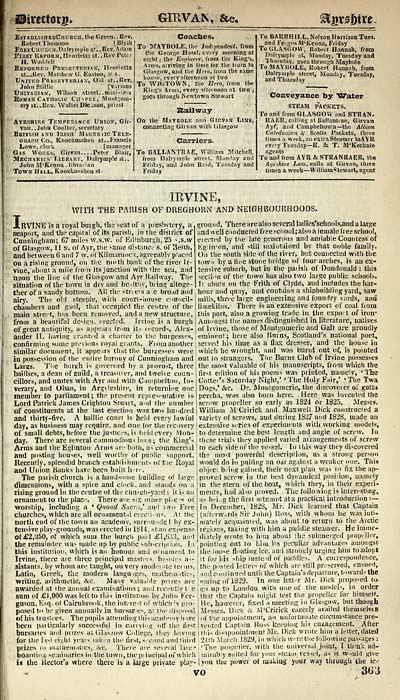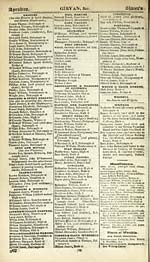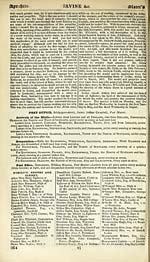Scotland > 1868, 1878 - Slater's (late Pigot & Co.'s) Royal national commercial directory and topography of Scotland > 1861
(375)
Download files
Complete book:
Individual page:
Thumbnail gallery: Grid view | List view

Uimtocg.
&IRVAN, &c.
@i&x&t)trz
EstabhshedChurch. the Green. .Rev.
Robert Thomson [Blylli
Flt,EEC'nuKCn,Da1rymple St. .Rev. Adam
FIRST Reform, Henrietta st. . Rev.Peter
' H. Waddell
Reformed Presbs'terian, Henrietta
si. ..Rev. Matthew Ci. Easton, M-.A,
United Presbyterian, Old sf..Rev,
John Stillie [various
Unitarian, Wilson street.'. ministers
Roman Catholic Cm pel, fVlonf>om-
ery st..Rev. Waller Drc.son, priest
Ayrshire Temperance Union, Gir-
van. .John Coulter, secretary
British and Irish Magneiic Tele-
graph Co., Knockusshen st.. Francis
Lowe, clerk [nianaqer
Gas \V6rks, Girvan Peter Blair,
Mechanics' Library, Dalryraple st,.
John M'Kenna. librarian
Town Hall, Knockusshen st
Coaches.
To MAYBOLE, the Independent, from
the George Hotel, every morning at
eight ; the' Engineer, from the King's,
Arms, arriving in time tor the tiain to
Glasgow, and the Hero, from the same
bouse, every afternoon at two
To WIGTOWN, the Hero, from the
King's Arms, every afternoon at two ;
goes through Newtown Stewart
Railway
On the Mateole ami Girvan Line,
connecting Girvan with Glasgow
Carriers.
To BALLANTRAE, William Mitchell,
from Dalryraple street, Monday and
Friday, and John Reid, Tuesday and
Friday
To BARRH ILL, Nelson Harrison Toes.
and Fergus M'Kenna, Friday
To GLASGOW, Robert Hannah, from
Dalryraple st, Monday, Tuesday and
Thursday, jrpes through Maybole
To MAYBOLE, Robert Hannah, from
Dalryraple street, Monday, Tuesday,
and Thursday
Conveyance by Water
STEAM PACKETS.
To and from GLASGOW and STRAW-
RAKR, calling at Ballantrae, Girvan
Ayr", and Campbeltown— the Albion
Caledonian §' Scotia Packets, three
times a week, an extra Steamer toAYR
every Tuesday— R. & T. M'Kechnie
R£TCt)tS
To and from AYR & STRANRAER, the
Ayrshire Lass, calls at Girvan, three
times a week — WilliamStewart, agent
IRVINE,
WITH THE PARISH OF DKEGHOUN AND NEIGHBOURHOODS.
J.RVINE is a royal burgh, the seat of a presbytery, a
seaport, and the capital of its parish, in the district of
Cunningham; 67 miles w.s.w. of Edinburgh, 25 -.s.w
of Glasgow, 1 1 n. of Ayr, the same distance s. of Beith,
and between 6 and 7 w. of Kilmarnock, agreeably placed
on a rising ground, on the north bank of the river Ir-
vine, about a mile from its junction with the sea, and
upon the line of the Glasgow and Ayr Railway. The
situation of the town is drv and hedttiy, being altoge-
ther of a sandy bottom. All the streets a e broad and
airy. The old steeple, with court-house council-
chambers and gaol, that occupied the centre of the
main street, bus been removed, and a new structure,
from a beautiful design, erected. Irvine is a burgh
of great antiquity, as appears ln>m its records, Alex-
ander II. having granted a charter to the burgesses,
confirming some previous royal giants. From another
similar document, it appears that the buttresses were
in possession of the entire barony of Cunningham and
Largs. The burgh is governed by a provost, three
baillies, a dean of guild, a treasurer, and twelve coun-
cillors, and unites with Ayr and with Campbelton, In-
verary, and Oban, in Argyllshire, in returning one
member to parliament; the present representative is
Lord Patrick James Crighton Stuart, and the number
of constituents at the last election was two hundred
and thirty-five. A baillie court is held every lawful
day, as business may require, and one for the recovery
of small debts, before the justices, is held every Mon-
day. There are several commodious inns; the King's
Arms and the Eglinton Arms are both, as commercial
and posting houses, well worthy of public support.
Recently, splendid branch establishments of the Royal
and Union Banks have been built here.
The parish church is a handsome building of" large
dimensions, with a spite and clock, and stands on a
rising ground in the centre of the church-yard : it is an
ornament to the place. There are six other plac s of
worship, including a * Quoad Sucra,' apd two Free
churches, which are all ornamental erections'. At the
north end of the town an academv, surrouwle I by ex-
tensive play-grounds, was erected in 1814, «tan expense
OfjE2,'250, of which sum the burgh paid £l,f>;53, and
the remainder was made up by public subscription. In
this institution, which is an honour and ornament to
Irvine, there are three principal masters besides as-
sistants, by whom are taught, on very modeiate terms,
Latin, Greek, the modern languages, mathematics,
writing, arithmetic, &c. Many valuable prizes are
awarded at ihe annual examinations; and recently t e
sum of £1,000 was left to this institution bv John Fer-
guson, Esq. of Cairnbrook, the interest of which : s pro-
posed to be given annually in bursarie<, at the disposal
of his trustees. The pupils attending this academy have
been particularly successful in carrying off the first
bursaries and prizes at Glasgow College, they having
for the list eight years taken the first, second and third
prizes in mathematics, Ike. There are several large
boarding seminaries in the town, the pj incipal of which
ground. There are also several ladies'schools,and a large
and well conducted free school; also a (emale free school,
etected by the late generous and amiable Countess of
Egiin'on, and still maintained by that noble family.
On the south side of the river, but connected with the
town by a fine stone bridge of four arches, is an ex-
tensive suburb, but in the parish of Dundonald : this
section of the town has also two large public schools.
It abuts on the Frith of Clyde, and includes the har-
bour and quay, and contains a shipbuilding yard, saw
mills, three large engineering and foundry yards, and
limekilns. There is an extensive export of coal from
this port, also a growing trade in the export of iron*
Amongst the names distinguished in literature, natives
of Irvine, those of Montgomerie and Gait are proudly
eminent; here also Burns, Scotland's national poet",
served his time as a flax dresser, and the house in
which he wrought, and was burnt out of, is pointed
out to strangers. The Burns Club of Irvine possesses
the most valuable of his manuscripts, from which the
first edition of his poems was printed, namely, « The
Cotter's Saturday Night,' 'The Holy Fair,' • The Twa
Dogs,' &c. Dr. Montgomerie, the discoverer of gutta
percha, was also born here. Here was invented the
screw propeller so early as 1824 or 1825. Messrs.
William M'Cririck and Maxwell Dick constructed a
variety of screws, and during 1827 and 1828, made an
extensive series of experiments with working models,
to determine the best length and angle of screw. In
these trials they applied varied arrangements of screw
to each side of the vessel. In t his way they discovered
the most powerful description, as a strong person
would do in pulling' an oar against a weaker one. This
object being gained, their next plan was to fix the ap-
proved screw in the best dynamical position, namely
in the stern of the boat, winch they, in their experi-
ments, had also proved. The following is interesting,
as bei„g the first attempt at a practical introduction • —
In December, 1828, Mr. Dick learned that Captain
(afterwards Sir John) Ross, with whom he was inti-
mately acquainted, was about to return to the Arctic
regions, taking with him a paddle steamer. He imme-
diately wrote to him about the submerged propeller,
pointing out lo hint i's peculiar advantages amongst
the loose floating ice, aud strongly urging him to adopt
it for his ship instead of paddles. A correspondence,
the pasted letters of which are still preserved, ensued,
.itid continued until the Captain's departure, towards the
spring of 1829. In one letter Mr. Dick proposed to.
go up to London with one of the models, in order
that the Captain might test the propeller for himself.
He, however, fixed a meeting in Glasgow, but though
Messrs. Dick iit M'Cririck eagerly availed themselvts
of the appointment, an unfortunate circumstance pre-
vented Captain Ross keeping his engagement. After
this disappointment Mr. Dick wrote him a letter, dated
24th March, 1829, in which were the following passages :
'The propeller, with the universal joint, I think ad-
mirably suited for your steam vessel, as it would give
is the Rector's where there is a large private play- 1 you the power of making your way through the ice
&IRVAN, &c.
@i&x&t)trz
EstabhshedChurch. the Green. .Rev.
Robert Thomson [Blylli
Flt,EEC'nuKCn,Da1rymple St. .Rev. Adam
FIRST Reform, Henrietta st. . Rev.Peter
' H. Waddell
Reformed Presbs'terian, Henrietta
si. ..Rev. Matthew Ci. Easton, M-.A,
United Presbyterian, Old sf..Rev,
John Stillie [various
Unitarian, Wilson street.'. ministers
Roman Catholic Cm pel, fVlonf>om-
ery st..Rev. Waller Drc.son, priest
Ayrshire Temperance Union, Gir-
van. .John Coulter, secretary
British and Irish Magneiic Tele-
graph Co., Knockusshen st.. Francis
Lowe, clerk [nianaqer
Gas \V6rks, Girvan Peter Blair,
Mechanics' Library, Dalryraple st,.
John M'Kenna. librarian
Town Hall, Knockusshen st
Coaches.
To MAYBOLE, the Independent, from
the George Hotel, every morning at
eight ; the' Engineer, from the King's,
Arms, arriving in time tor the tiain to
Glasgow, and the Hero, from the same
bouse, every afternoon at two
To WIGTOWN, the Hero, from the
King's Arms, every afternoon at two ;
goes through Newtown Stewart
Railway
On the Mateole ami Girvan Line,
connecting Girvan with Glasgow
Carriers.
To BALLANTRAE, William Mitchell,
from Dalryraple street, Monday and
Friday, and John Reid, Tuesday and
Friday
To BARRH ILL, Nelson Harrison Toes.
and Fergus M'Kenna, Friday
To GLASGOW, Robert Hannah, from
Dalryraple st, Monday, Tuesday and
Thursday, jrpes through Maybole
To MAYBOLE, Robert Hannah, from
Dalryraple street, Monday, Tuesday,
and Thursday
Conveyance by Water
STEAM PACKETS.
To and from GLASGOW and STRAW-
RAKR, calling at Ballantrae, Girvan
Ayr", and Campbeltown— the Albion
Caledonian §' Scotia Packets, three
times a week, an extra Steamer toAYR
every Tuesday— R. & T. M'Kechnie
R£TCt)tS
To and from AYR & STRANRAER, the
Ayrshire Lass, calls at Girvan, three
times a week — WilliamStewart, agent
IRVINE,
WITH THE PARISH OF DKEGHOUN AND NEIGHBOURHOODS.
J.RVINE is a royal burgh, the seat of a presbytery, a
seaport, and the capital of its parish, in the district of
Cunningham; 67 miles w.s.w. of Edinburgh, 25 -.s.w
of Glasgow, 1 1 n. of Ayr, the same distance s. of Beith,
and between 6 and 7 w. of Kilmarnock, agreeably placed
on a rising ground, on the north bank of the river Ir-
vine, about a mile from its junction with the sea, and
upon the line of the Glasgow and Ayr Railway. The
situation of the town is drv and hedttiy, being altoge-
ther of a sandy bottom. All the streets a e broad and
airy. The old steeple, with court-house council-
chambers and gaol, that occupied the centre of the
main street, bus been removed, and a new structure,
from a beautiful design, erected. Irvine is a burgh
of great antiquity, as appears ln>m its records, Alex-
ander II. having granted a charter to the burgesses,
confirming some previous royal giants. From another
similar document, it appears that the buttresses were
in possession of the entire barony of Cunningham and
Largs. The burgh is governed by a provost, three
baillies, a dean of guild, a treasurer, and twelve coun-
cillors, and unites with Ayr and with Campbelton, In-
verary, and Oban, in Argyllshire, in returning one
member to parliament; the present representative is
Lord Patrick James Crighton Stuart, and the number
of constituents at the last election was two hundred
and thirty-five. A baillie court is held every lawful
day, as business may require, and one for the recovery
of small debts, before the justices, is held every Mon-
day. There are several commodious inns; the King's
Arms and the Eglinton Arms are both, as commercial
and posting houses, well worthy of public support.
Recently, splendid branch establishments of the Royal
and Union Banks have been built here.
The parish church is a handsome building of" large
dimensions, with a spite and clock, and stands on a
rising ground in the centre of the church-yard : it is an
ornament to the place. There are six other plac s of
worship, including a * Quoad Sucra,' apd two Free
churches, which are all ornamental erections'. At the
north end of the town an academv, surrouwle I by ex-
tensive play-grounds, was erected in 1814, «tan expense
OfjE2,'250, of which sum the burgh paid £l,f>;53, and
the remainder was made up by public subscription. In
this institution, which is an honour and ornament to
Irvine, there are three principal masters besides as-
sistants, by whom are taught, on very modeiate terms,
Latin, Greek, the modern languages, mathematics,
writing, arithmetic, &c. Many valuable prizes are
awarded at ihe annual examinations; and recently t e
sum of £1,000 was left to this institution bv John Fer-
guson, Esq. of Cairnbrook, the interest of which : s pro-
posed to be given annually in bursarie<, at the disposal
of his trustees. The pupils attending this academy have
been particularly successful in carrying off the first
bursaries and prizes at Glasgow College, they having
for the list eight years taken the first, second and third
prizes in mathematics, Ike. There are several large
boarding seminaries in the town, the pj incipal of which
ground. There are also several ladies'schools,and a large
and well conducted free school; also a (emale free school,
etected by the late generous and amiable Countess of
Egiin'on, and still maintained by that noble family.
On the south side of the river, but connected with the
town by a fine stone bridge of four arches, is an ex-
tensive suburb, but in the parish of Dundonald : this
section of the town has also two large public schools.
It abuts on the Frith of Clyde, and includes the har-
bour and quay, and contains a shipbuilding yard, saw
mills, three large engineering and foundry yards, and
limekilns. There is an extensive export of coal from
this port, also a growing trade in the export of iron*
Amongst the names distinguished in literature, natives
of Irvine, those of Montgomerie and Gait are proudly
eminent; here also Burns, Scotland's national poet",
served his time as a flax dresser, and the house in
which he wrought, and was burnt out of, is pointed
out to strangers. The Burns Club of Irvine possesses
the most valuable of his manuscripts, from which the
first edition of his poems was printed, namely, « The
Cotter's Saturday Night,' 'The Holy Fair,' • The Twa
Dogs,' &c. Dr. Montgomerie, the discoverer of gutta
percha, was also born here. Here was invented the
screw propeller so early as 1824 or 1825. Messrs.
William M'Cririck and Maxwell Dick constructed a
variety of screws, and during 1827 and 1828, made an
extensive series of experiments with working models,
to determine the best length and angle of screw. In
these trials they applied varied arrangements of screw
to each side of the vessel. In t his way they discovered
the most powerful description, as a strong person
would do in pulling' an oar against a weaker one. This
object being gained, their next plan was to fix the ap-
proved screw in the best dynamical position, namely
in the stern of the boat, winch they, in their experi-
ments, had also proved. The following is interesting,
as bei„g the first attempt at a practical introduction • —
In December, 1828, Mr. Dick learned that Captain
(afterwards Sir John) Ross, with whom he was inti-
mately acquainted, was about to return to the Arctic
regions, taking with him a paddle steamer. He imme-
diately wrote to him about the submerged propeller,
pointing out lo hint i's peculiar advantages amongst
the loose floating ice, aud strongly urging him to adopt
it for his ship instead of paddles. A correspondence,
the pasted letters of which are still preserved, ensued,
.itid continued until the Captain's departure, towards the
spring of 1829. In one letter Mr. Dick proposed to.
go up to London with one of the models, in order
that the Captain might test the propeller for himself.
He, however, fixed a meeting in Glasgow, but though
Messrs. Dick iit M'Cririck eagerly availed themselvts
of the appointment, an unfortunate circumstance pre-
vented Captain Ross keeping his engagement. After
this disappointment Mr. Dick wrote him a letter, dated
24th March, 1829, in which were the following passages :
'The propeller, with the universal joint, I think ad-
mirably suited for your steam vessel, as it would give
is the Rector's where there is a large private play- 1 you the power of making your way through the ice
Set display mode to: Large image | Transcription
Images and transcriptions on this page, including medium image downloads, may be used under the Creative Commons Attribution 4.0 International Licence unless otherwise stated. ![]()
| Scottish Post Office Directories > Scotland > Slater's (late Pigot & Co.'s) Royal national commercial directory and topography of Scotland > 1861 > (375) |
|---|
| Permanent URL | https://digital.nls.uk/90205776 |
|---|
| Attribution and copyright: |
|
|---|---|
| Description | Directories of the whole, or large parts of, Scotland. |
|---|
| Description | Around 700 Scottish directories published annually by the Post Office or private publishers between 1773 and 1911. Most of Scotland covered, with a focus on Edinburgh, Glasgow, Dundee and Aberdeen. Most volumes include a general directory (A-Z by surname), street directory (A-Z by street) and trade directory (A-Z by trade). |
|---|


